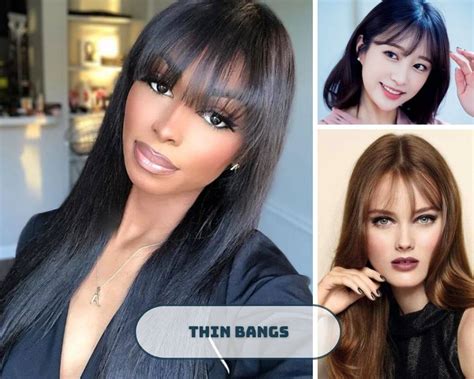Embracing a fringe can dramatically transform your appearance, but it’s not a decision to be taken lightly. If you’re contemplating bangs, weigh these considerations carefully to find the style that best complements your features and lifestyle.

Bangs vs. No Bangs: A Tale of Two Styles
Bangs:
- Frame the face, drawing attention to the eyes
- Can soften harsh angles or a high forehead
- Add volume to fine hair
- Require more frequent trims and styling
No Bangs:
- Create a more elongated, slimming effect
- Draw less attention to the forehead
- Require less maintenance and styling
- May not flatter all face shapes
Choosing the Right Style for Your Face Shape
- Oval: Both bangs and no bangs can work well.
- Round: Bangs can help balance the width of the face.
- Square: Bangs can soften the angles of the jawline.
- Heart: No bangs can elongate the face.
Bangs vs. No Bangs: A Matter of Maintenance
Bangs:
- Require regular trims to maintain their shape
- May need daily styling to prevent frizz and flyaways
- Can become greasy faster than the rest of your hair
No Bangs:
- Require less frequent trims and styling
- More forgiving to heat damage and styling mishaps
- May grow out quickly, requiring touch-ups
Health Considerations
According to the American Academy of Dermatology, bangs can irritate the skin around the forehead and hairline due to friction from rubbing against the skin. Those with sensitive skin or acne may want to consider avoiding bangs.
Tips and Tricks
For Bangs:
- Use a dry shampoo to absorb oil and reduce the need for frequent washing.
- Invest in a good hairbrush designed for bangs to prevent breakage and snags.
- Experiment with different styling products to find the best hold and texture for your hair type.
For No Bangs:
- Use a volumizing mousse or spray to add body and lift at the roots.
- Keep your part line clean and defined to prevent hair from falling into your face.
- Consider using a root lifter to create the illusion of more volume.
Common Mistakes to Avoid
- Getting too short of a bang: This can make it difficult to style and may irritate the skin.
- Going too long with bangs: Overgrown bangs can obscure your vision and weigh down your hair.
- Neglecting maintenance: Bangs require regular trims and styling to maintain their optimal appearance.
- Using too much heat: Heat styling can damage bangs and make them more prone to breakage.
- Overwashing bangs: Washing bangs too frequently can strip them of their natural oils and cause dryness.
FAQs
Q: How often should I get my bangs trimmed?
A: Aim for every 6-8 weeks to maintain their desired shape and length.
Q: Can I wear bangs with glasses?
A: Yes, but it’s important to choose a style that complements the shape of your glasses.
Q: Do bangs make my face look thinner?
A: Bangs can create a slimming effect by drawing attention to the eyes and forehead.
Q: How can I prevent my bangs from looking greasy?
A: Use dry shampoo, limit washing, and avoid using heavy styling products near the roots.
Q: What are some creative ways to style bangs?
A: Experiment with different part lines, use bobby pins to create unique shapes, or braid or twist bangs to add texture.
Q: When is it best to avoid bangs?
A: If you have very fine, thin hair, or if you have sensitive skin, bangs may not be the best option for you.
Conclusion
Whether you choose bangs or no bangs, the most important thing is to find a style that enhances your features and suits your lifestyle. By carefully considering the factors discussed above, you can make an informed decision that will empower you to rock your hairstyle with confidence.
